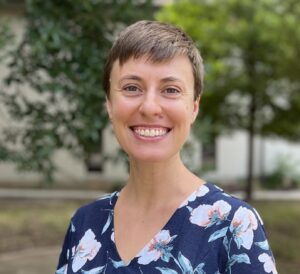Trained primarily in devised and physical theater methods, Ruthie is a director, playwright, and teacher who relies heavily on her English literature background in her work.
Ruthie received a B.A. in English literature from Wheaton College in Illinois, where she was a member of Arena Theater’s “Workout” ensemble. After working for Pittsburgh Public Theater and Pittsburgh’s City Theatre, she earned an M.A. in educational theatre from NYU Steinhardt, with an emphasis on directing and devising for colleges and communities.
She spent time working as a teaching artist in NYC before moving to Boston, where she worked with Company One Theatre. While there she also founded the theater program at Roxbury Preparatory Charter School, Dorchester Campus.
In the fall of 2019 Ruthie and her husband Bruce set out on a series of artist residencies. During 2019-2020 they traveled across the USA and Ruthie spent time as a playwriting artist in residence at Laity Lodge in Texas, Harrison Center for the Arts in Indiana, and Grunewald Guild in Washington.
They relocated to San Antonio, where Ruthie has begun working with theaters in the city, including the Tobin Center for the Performing Arts. In February 2023 she staged her original script We Sail On In Darkness, which tells the stories of four female mystics, to sold out audiences in San Antonio. She continues to offer movement workshops and devised theater classes while working on new material for her next production.
Resume (PDF)
Artist Statement of Work
Hope is found in the interconnection of people, and it is this through line that sustains my artistry. It is the common theme in each of my plays and the connecting force between my separate worlds of deviser, director, teacher, and playwright. It unites the small girl who first understood that stories have power, but didn’t know why, to the woman I am today who has made it her life’s work to explore what is so compelling about the friction and spark of people in communion.
When I was thirteen I stumbled across an audiobook in the library called "Shadow Spinner" (Susan Fletcher). This YA novel, about a young woman who tells stories in order to save lives, touched me so deeply that I continued to listen to it over and over. What was it, I asked myself, about this story that was so compelling? It wasn’t just that I saw my own interests reflected in the life of the protagonist. There was something meaningful in her assertion that stories could change the world, and even deeper than that, her connection to the lives of the people she told stories to. The power of her words convinced me that the subtlety of a story–a quiet word spoken on the page of a book or in the hush of a theater–was the most powerful force in the world. The power of connection could break any chain.
As I have matured as a person and as an artist, my understanding of the importance of hope has grown in proportion to my own experience and knowledge of the suffering world I live in. What captivated me as a teenager and set me on a course to seek out that beautiful, dangerous power, has transformed into a continual search to create spaces where something true and real is offered to a world of increasing disunity and isolation. I tell stories about women (of all ages) and I tell stories of connection, and in that niche I have found a deep and complex hope. Often my characters are separated by distance, experience, or even time, but they are connected nonetheless, and in their connection my hope is that the audience will understand that we are all integral to one another.
Most of my career has been spent working in devised theater, a form of theater that is highly collaborative and interested not just in creating excellent art, but particularly in the audience’s experience of it. As I transition more and more into playwriting, this impulse remains with me. I write with an eye to the women who will inhabit the characters, but also with an eye to the people who will fill the seats (or floor) of the theater. For me, theater does not need elaborate lighting, realistic sets and costumes, or special effects. What the audience craves is the chance to see another human speaking lovingly, truthfully–perhaps painfully–and directly to them. We must interact with, connect with, and look each other in the eye. Therein lies hope, and the pursuit of that hope is my life’s work.

